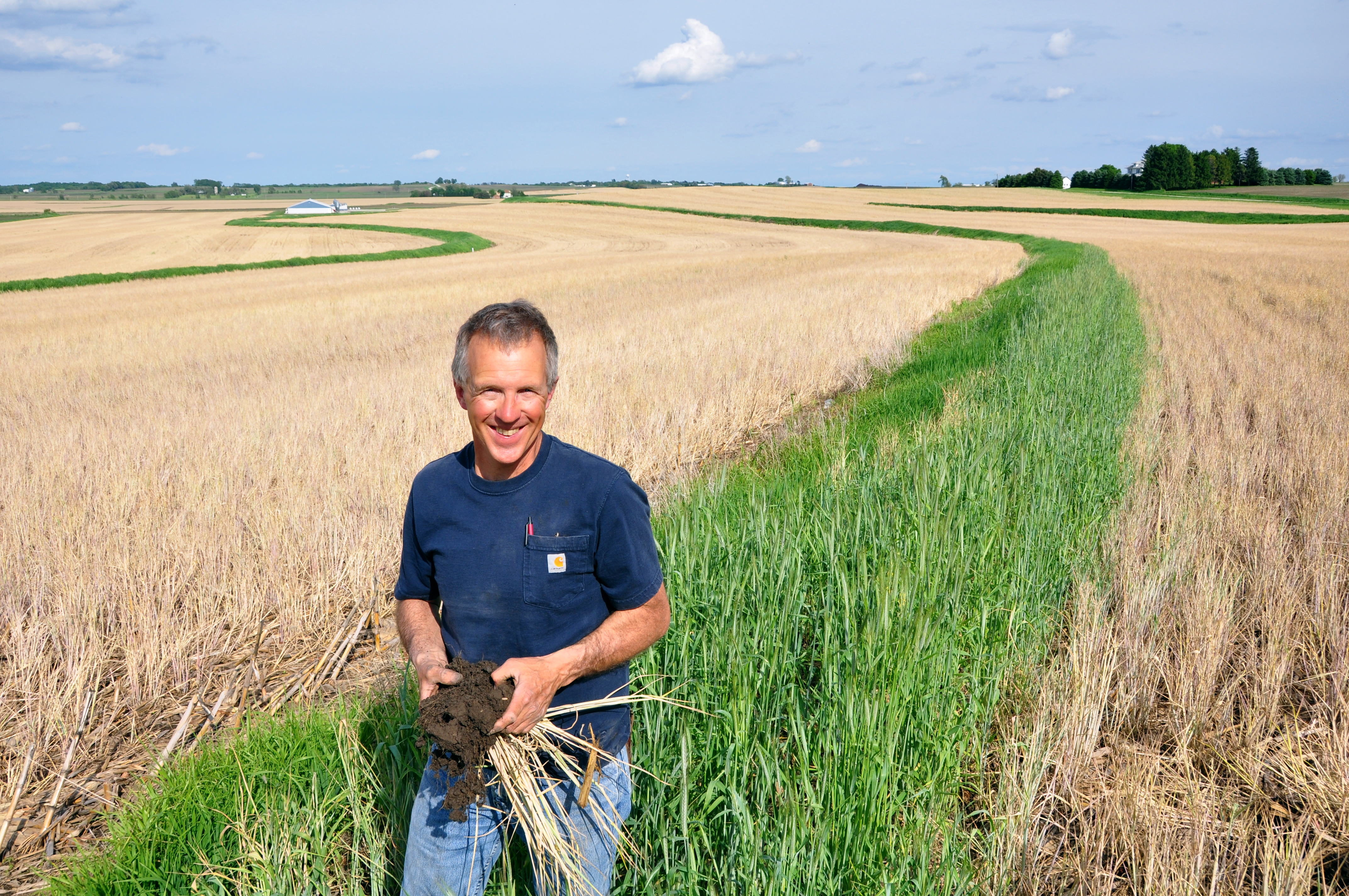
“Grandfather of Cover Crops,” Award Winning Conservationist
Steve Berger deems Iowa’s rich farmland soils the second most important Iowa asset—outranked only by family. Everything he does on his 2,200 acre corn-soybean operation, the hundreds of hours he volunteers to educate other farmers and his philanthropy reflect his conservation ethic and his love of farming.
Berger (‘86 agricultural business) attributes these values to his father, Dennis, with whom he still farms near Wellman, Iowa. But, he credits Iowa State University Extension and Outreach for his father’s decision in the 1970s to stop tilling the family’s farmland.
“We had a really progressive Washington County Extension Director, Jim Frier (’56 farm operations). He was encouraging farmers in the 1970s to adopt no-till. We’ve benefitted because we stuck with it,” says Berger.
The family’s farmland has been almost 100 percent no-till for 35 years. Fifteen years ago Berger decided to add cover crops to his fields to aid in holding the soil on the land during the seasons when no cash crop was growing. He stuck with that decision as well.
Through trial and error and over time, making adjustments to his corn planter, nitrogen applications and pest management strategies, he learned how to make it work on his fields. In addition to slowing soil erosion, it has improved soil health and water holding capacity, while maintaining or increasing cash crop yields.
Berger’s conservation efforts and successes were acknowledged in 2014 with the Spencer Award for Sustainable Agriculture from the Leopold Center and, in 2015, with the Conservation Legacy Award from the American Soybean
Association.
It has taken time, says Berger, of his success with cover crops.
“When you’re working with the soil, it’s not like a light switch. You can’t just change things and
see immediate results. The soil needs time to transition.”
Berger says the conversion time of three to four years is difficult for farmers.
“There’s a cost to growing cover crops. In this age of high land rents, demanding landlords and bankers and farmers who don’t agree, it’s hard to make these longerterm decisions, but there’s a big pay off if you can stick with it,” says Berger.
The ‘pay off,’ says Jason Steele, is that the soils on Berger’s land are “phenomenal.”
Steele (‘00 agronomy and animal science) is a soil scientist for the National Resources Conservation Service (NRCS)
and a farmer. He has done soil tests on Berger’s farm since Berger became a part of their Soil Health Campaign in 2012. As a part of that campaign, Berger is a cover crop mentor for farmers less experienced with cover crops. He shares what he has learned at NRCS and Soil and Water Conservation District field days.
“It makes a difference with audiences that Steve is a farmer using no-till and cover crops and that he is not afraid to tell other farmers and landowners about the failures as well as the successes he’s had,” says Steele.
Berger gained appreciation and compassion for farmer risks and challenges during his college years amid the 1980s farm crisis and especially during the year after his graduation when he worked as a liaison between the Farmer-Creditor Mediation Service and Iowa Governor Branstad’s office. During the 1980s, crop demand and profits had plummeted, exceptionally high interest payments on farm loans often exceeded farm income and thousands of previously successful farmers had to sell their farms.
“Most of my classmates did not want to go home and farm after graduation. It was nothing like it is today,” says Berger. “You can see the investment in agriculture that’s been made since then. It’s a real exciting time now and I can appreciate it because of past experiences.”
Berger’s appreciation shows through generous sharing of his time, knowledge and treasure. Countless Iowans benefit from his dedication to and passion for farming, learning, teaching and Iowa State University.
Matthew Helmers, professor of agriculture and biosystems engineering, has invited Berger to speak at Iowa State Extension and Outreach field days and has dubbed him the ‘grandfather of cover crops.’
Berger jokingly protests, saying, “Hey, I’m not that old.”
“I just mean that he’s one of our most experienced cover crop farmers in the state. People view him very positively for making cover crops work on his farm and for helping others,” says Helmers.
Helmers and Berger are both eager to learn more about soil microbiology.
“We’re all still learning. Soil science is really a frontier. We’ll know a lot more in five or ten years,” says Berger. “Farmers are really hungry for knowledge about this.”
In addition to collaborating with Iowa State scientists to do on-farm research and speaking at field days for Iowa State Extension and Outreach and Iowa Learning Farms, Berger’s service to Iowa State is impressive. He served on
the Agricultural Endowment Board, the College of Agriculture and Life Sciences Advisory Council and the Iowa Soybean Research Center Advisory Council.
He’s an Iowa Learning Farms Partner and a financial supporter of Iowa State University—from helping to purchase additional acres to conduct farm research to donating to the new addition of the FarmHouse fraternity.
Steve Berger says 15 years of cover cropping has improved soil porosity on his 2,200 acres in Washington County.
“The soil can hold more water and take in rain at a faster rate.”



